
Preeminent Personalities Honored in Peoria Dr. Richard Greathouse, Dorothy Welsh & Gayle Kaye
Celebrate the honorees at the Quarter Century Collie Group event in Peoria: Dr. Richard Greathouse, Dorothy Welsh, and Gayle Kaye.
Home » Dog Breeds » Collie Dog Breed
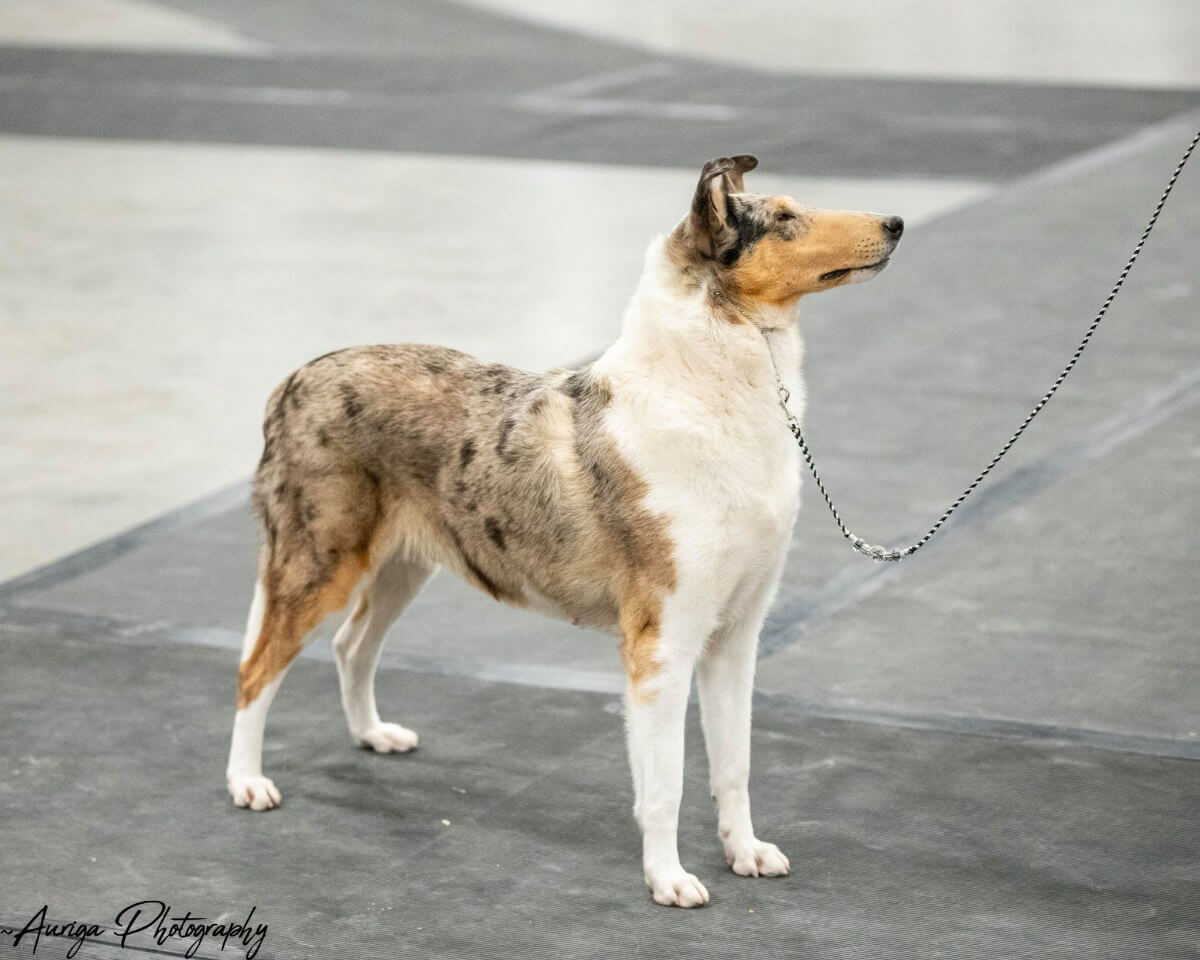
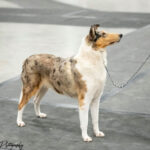
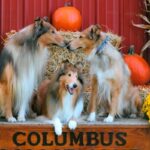
The Collie is renowned for its predictable and easy-going nature, displaying both intelligence and friendliness in its demeanor. Originating from Scotland, the breed historically served as a herding dog and guardian, showcasing its exceptional agility, stamina, and trainability. During the 20th century, the breed achieved remarkable notoriety through a series of beloved books and films as well as a long-running television series. Today, the breed’s graceful appearance, combined with its keen intellect, makes it a preferred choice for both suburban families and active dog enthusiasts. With the breed’s abundant coat and striking appearance, the Collies remains well-suited for life in both a pastoral setting and in the contemporary home.
Herding
22 – 26 Inches
50 – 75 Pounds
12 – 14 Years
| Country of Origin | Scotland |
|---|---|
| Bred For | Sheep Herding, Companionship |
| Known For | Expression, Gentleness, Loyalty |
| Popularity | High |
| Temperament | Active, Devoted, Friendly |
| Activities | Herding, Guarding, Running, Hiking, Conformation Shows, Dog Sports |
The Collie has a rich history, with origins that trace back to the highlands of Scotland and Northern England. The breed was used primarily as a herding dog, tasked with guarding flocks of sheep and herds of cattle. Its name is believed to be derived from the Scottish dialect word “colley,” referring to sheep with black faces and legs. The dogs were invaluable to shepherds and farmers, showcasing an innate herding instinct and a strong work ethic.
Over time, the breed’s intelligence and graceful appearance garnered attention beyond the fields. The breed’s popularity soared in the 19th century, particularly after Queen Victoria took a keen interest in the breed during a visit to Scotland. Her admiration led to increased demand, and breeders began refining the Collie for exhibition at dog shows as well as for companionship.
The Collie was officially recognized by the American Kennel Club (AKC) in 1885, marking a significant milestone in the breed’s history. The breed has since remained a beloved choice for many families and dog enthusiasts on both sides of the Atlantic, well-known for its loyalty, intelligence, and striking appearance.
In addition to the breed’s herding abilities, Collies have proven themselves in a variety of ways, showcasing both their versatility and their eagerness to work alongside their human partners. They have also made a mark in popular culture, most notably through the character of Lassie, a fictional Rough Collie who starred as the protagonist in many books, movies, and a popular television series. These highly acclaimed series further cemented the breed’s place in the hearts of people in America and around the world.
The Collie’s journey from The Highlands to homes and hearts worldwide highlights the breed’s adaptability and enduring appeal. Today, it remains a living testament to the intelligence, grace, and unwavering loyalty of its ancestors, traits that have allowed the breed to be cherished by generations of devoted fans and followers.
Adult male Collies typically stand between 24 and 26 inches tall at the withers, presenting a robust and well-proportioned physique. Mature females generally measure slightly less, with a height range from 22 to 24 inches.
In terms of weight, males commonly weigh within the range of 60 to 75 pounds. Females, on the other hand, tend to be somewhat lighter, often weighing between 50 and 65 pounds.
The Collie presents a picture of balance and proportion, with a body that is slightly longer than it is tall. The breed’s substance is solid without appearing heavy, affording the ability to work efficiently as a herding dog. The Collie’s strong back and muscular quarters provide the necessary power for quick movement and endurance. The breed’s deep chest and well-sprung ribs ensure stamina and agility.
Texture: Except for the head and legs, the coat of the Collie is attractively profuse. There is an abundant mane and frill around the neck, and long and bushy hair over the hips. Considerable feathering is found on the backs of the front legs and on the back legs above the hocks, and the tail carries heavy feathering.
The Collie’s coat appears in two distinct coat varieties: Rough and Smooth. In general, the Rough Collie’s natural coat is said to “fit the dog.” Similarly, the Smooth Collie’s coat is harsh and dense but it lacks the length and distribution of its cousin.
The Rough Collie has a luxurious, abundant coat that stands away from the body, with a texture that’s straight and harsh to the touch. The coat provides a rather grand appearance and provides insulation and protection from the elements. The undercoat is soft and dense, further adding to the coat’s insulation and fullness.
The Smooth Collie, by contrast, has a shorter coat that retains the same strength, density, and texture. The coat of this variety lies closer to the body, showcasing a sleek, streamlined appearance while still offering both protection and warmth.
Regardless of the variety, the Collie’s coat is designed to shield the dog from harsh weather and rough terrain of the Scottish Highlands.
| Standard Color | |
|---|---|
| Black White & Tan | ee |
| Blue Merle | ee |
| Blue Merle & White | ee |
| Blue Merle White & Tan | ee |
| Sable | ee |
| Sable & White | ee |
| Sable Merle | ee |
| Sable Merle & White | ee |
| White | ee |
| White Merle | ee |
| Standard Marking | |
|---|---|
| Black & Tan Markings | ee |
| Blue Merle Markings | ee |
| Sable | ee |
| Sable Merle Markings | ee |
A Note About Color: There are four recognized colors in the breed: Sable and White; Tri-Color; Blue Merle; and White. Sable and White is predominantly sable in varying shades from light gold to mahogany. Tri-Color is predominantly black with markings and tan shadings on the head and legs. Blue Merle is a mottled coloration of predominantly blue-gray and black with white markings, and usually, tan shadings. White is predominantly white with sable, tri-color, or blue markings. No color or markings are preferred in the breed.
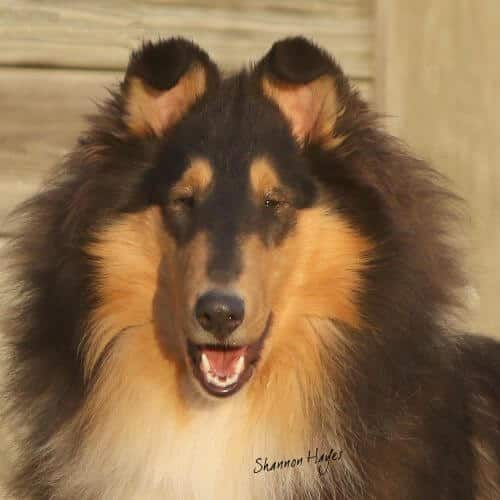
The Collie’s tail is moderately long, reaching at least to the hock joint, with an upward swirl or twist at the end. It is carried low when the dog is at rest, reflecting the breed’s calm and composed nature. When alert or excited, the dog may carry its tail higher but never curled over the back.
The tail is well furnished with an abundance of hair, which adds considerably to the breed’s appeal. The hair on the tail is long and dense, forming a bushy appearance that showcases the breed’s beauty and elegance.
The tail of the Collie is important to the breed’s overall balance and symmetry. It is never docked. Rather, the tail reflects the breed’s usefulness in the Scottish Highlands as a working dog of great character and charm.
The Collie, renowned for its elegance, intelligence, and herding prowess, holds a special place in the hearts of dog lovers everywhere. The decision to bring one of these impressive canines into the home entails understanding the breed’s specific needs and characteristics.
The Collie is generally a hearty and resilient dog, known for its endurance and vitality. Despite the breed’s robust nature, some individuals can be predisposed to certain health conditions. It is imperative to establish a partnership with a reputable Collie breeder and a trusted veterinarian to safeguard the health and welfare of a dog throughout its life.
With a typical lifespan ranging from 12 to 14 years, the Collie can thrive when provided with a balanced diet, regular exercise, and annual veterinary exams. Proactive care can significantly contribute to a long and vital life.
The Collie is generally a hardy breed but it does have a few potential health risks. Being proactive in monitoring and addressing these conditions can help to ensure a long and healthy life. The potential health risks include:
Routine veterinary check-ups, a balanced diet, and appropriate exercise can significantly contribute to a Collie’s overall health and wellness. This regimen helps to manage the risks and can greatly enhance the dog’s quality of life. Choosing a responsible breeder who screens their breeding stock for these conditions, however, is a critical first step.
The Collie is known for its predictable and easy-going nature, making the breed a popular choice among both experienced and novice dog owners. These dogs typically exhibit a gentle and patient demeanor along with a protective instinct, which makes them an ideal choice for households with children.
While Collies do well in families and tend to get along well with other dogs, it is crucial to ensure proper socialization from a young age. The breed is known for being sensitive, so these dogs respond best to positive reinforcement and gentle training methods. Their sensitivity also means they may not cope well with being left alone for extended periods, so they thrive best in environments where they are part of the family’s activities.
Regarding interactions with strangers, Collies are generally friendly but can be reserved. Early introductions to new people, places, and situations can help to ensure a puppy grows up to become a well-rounded and confident adult.
In terms of trainability, Collies are intelligent and eager to please, which usually makes training a straightforward process. However, like any honest herding dog, they can occasionally display a streak of independence. Consistent, patient training is the key to encouraging a well-behaved companion or working partner.
Given the Collie’s herding heritage, some dogs may show a tendency to herd small children and other pets. This natural impulse is something owners of the breed should be mindful of. Channeling this instinct through controlled activities and organized dog sports can provide a fun and effective outlet for managing a dog’s desire to herd members of the family.
Feeding a Collie a balanced and nutritious diet is paramount to the dog’s overall health and well-being. Owners should pay close attention to the quality of the food provided, ensuring it meets the dog’s specific age, weight, and condition requirements.
For Collie puppies, it is recommended to feed a high-quality puppy formula that supports rapid growth and development. As a pup transitions to adulthood, its dietary needs will change and an adult dog formula will be needed.
The amount of food a Collie requires can vary based on the dog’s age, weight, and activity level, but on average, an adult may require 2 to 3 cups of dry food per day. This should be divided into two or three meals to aid in digestion and to prevent bloat, a condition to which some dogs can be prone.
Monitoring the Collie’s weight is crucial, as this breed can be prone to obesity. Regular vet check-ups can help to keep weight in check, and providing a balanced diet, coupled with regular exercise, will contribute significantly to overall health, promoting a longer and more vibrant life.
A Collie should always have access to fresh water, ensuring it stays well-hydrated throughout the day. Additionally, treats can be used as rewards during training sessions, but they should be given in moderation to avoid excessive weight gain. Vegetables can be a nutritious, low-calorie option.
The Collie is renowned for its intelligence and trainability, making these dogs a pleasure to work with for both novice and experienced dog owners. However, the breed’s sensitivity requires a gentle training approach, as they respond best to positive reinforcement and may shut down if treated harshly.
The breed’s intelligence means Collies pick up on commands quickly, but it also means they require mental stimulation to prevent boredom. Engaging in training activities, puzzle toys, and interactive games can help to keep the dog’s mind active and engaged. Consistency is key in training, as routine and clear expectations produce the best results.
While Collies are not known for excessive barking, they will alert their owners to strangers and unusual activities around the house and yard. Training them to understand when to stop barking is important for maintaining a peaceful household and good relations with the neighbors.
The Collie has a moderate to low need to wander, which means it is less likely to roam far from home. However, a secure, fenced-in yard is recommended to provide the dog with a safe space to exercise and play. Together with proper training and socialization from a young age, a safe environment will support the dog’s typically friendly and fun-loving nature.
The Collie possesses a substantial amount of energy and requires regular exercise to maintain optimal health and happiness. The energetic and playful nature of these dogs makes them enthusiastic participants in a variety of physical dog sports, and they particularly enjoy activities that engage both their mind and body.
| Energy Level | Moderate |
|---|---|
| Exercise Requirements | 2 Hours/Day (Minimum), Daily Walks, Vigorous Running, Regular Exercise, Playing with Another Dog, Mental Stimulation |
On average, a Collie requires at least an hour of exercise per day, but these dogs can easily handle more if it’s available to them. Sessions can be split into multiple daily walks and other activities. They enjoy a good free-run and have a high degree of playfulness, making them great companions for most outdoor adventures.
Their herding instincts mean Collies thrive on activities that challenge them mentally as well as physically. Engaging in dog sports like Agility, Obedience, or Herding Trials can provide the necessary stimulation and are excellent outlets for their energy.
Despite the breed’s energy levels, Collies are adaptable and can adjust to their family’s lifestyle. However, they are not well-suited to a sedentary lifestyle and can become bored or destructive if not provided with adequate exercise.
Regular exercise also helps in maintaining a Collie’s healthy weight, which is particularly important for this breed as they can be prone to obesity. Alongside physical activity, mental stimulation is a must for this breed, as Collie’s excel in environments where they are given tasks to do and problems to solve.
The Collie’s coat, whether rough or smooth, demands regular grooming to maintain its health and beauty. Since the breed is known to shed, heavily during the spring and fall seasons, it’s crucial for owners to establish a consistent grooming routine.
| Coat Type | Dense, Straight, Harsh (Rough & Smooth) |
|---|---|
| Grooming Requirements | Weekly Brushing, Occasional Bathing, Routine Ear Cleaning, Periodic Nail Trimming, Regular Tooth Brushing |
For Rough Collies, the abundant coat requires brushing at least two to three times each week to prevent matting and to keep the coat free of debris and tangles. During the shedding seasons, daily brushing can become necessary to manage the increased hair loss and to distribute the coat’s natural oils.
Smooth Collies, with their shorter coats, require less intensive grooming but still benefit from regular brushing. A weekly session should suffice, helping to remove the loose hair and maintain the coat’s condition. For both coat types, paying attention to areas prone to matting, such as behind the ears and under the legs, is important.
In addition to brushing the coat, regular nail trimming, ear cleaning, and dental care are essential for the Collie. Keeping the nails short prevents discomfort and potential health issues, while clean ears help to prevent infections from taking hold. Incorporating dental care, through brushing or dental chews, contributes to oral health and minimizes bad breath.
By maintaining a consistent grooming regimen, the Collie can be expected to stay in top condition. Through regular grooming sessions, the coat will always look its best and any potential health issue can be caught early on. Also, an important benefit is the connection between both dog and groomer that’s strengthened with every session.
Collies are versatile and adaptable, capable of thriving in various living situations when their needs are adequately met. They develop a strong bond with their families and are happiest when included in daily activities.
Living in an apartment is possible with a Collie, although it does come with some challenges. This is a large and active breed, requiring ample space to move around comfortably. Therefore, apartment dwellers should ensure they can provide enough exercise and mental stimulation to compensate for the lack of space. Regular walks, play sessions, and engagement in activities that challenge the dog’s intellect are crucial for a Collie living in a smaller space.
When it comes to weather, Collies are fairly adaptable. Their double coat provides insulation, making them well-suited to colder climates. However, it’s crucial to provide shade and plenty of fresh water during hotter periods, as the breed’s thick coat can make these dogs prone to overheating. Regular grooming also plays a vital role in keeping them comfortable, regardless of the weather.
The Collie’s abundant coat can trap heat, so it is essential to be mindful of signs of overheating. During hot summer months, it’s vital to be sure the dog has a cool and shaded area to rest, along with access to fresh water. Proper grooming helps with maintaining the dog’s comfort levels, and it manages the coat’s inevitable shedding, but owners should always remain vigilant and avoid intense exercise during the hottest parts of the day.
Raising a litter of Collie puppies is a joyful and rewarding experience, marked by moments of shared learning. Those little Lassies are known for their intelligence and eagerness to please, traits that make them responsive to training but also in need of guidance and socialization from a young age.
Caring for a Collie puppy requires a commitment to its overall well-being, encompassing the growing pup’s physical, mental, and emotional needs. During the formative weeks and months, it’s crucial to provide a safe, nurturing environment that supports the puppy’s growth and development.
Socialization is a critical aspect of puppy care. By exposing the new family member to a variety of people, places, and experiences in a positive manner, its temperament can be shaped in ways that support its overall development. Gentle handling and constructive interactions are needed at this time to lay the foundation for trusting relationships.
Collies are intelligent and learn quickly at any age and respond best to positive reinforcement and consistency. Training should start early, focusing on basic commands and housebreaking. Establishing routines and setting clear boundaries helps in creating a sense of security for the puppy.
Nutrition plays a vital role in the pup’s development, and providing a balanced diet formulated for puppies is essential. Regular veterinary check-ups are also essential for monitoring growth and addressing any potential health concerns promptly.
Engaging the Collie puppy in age-appropriate play and exercise aids in burning off its abundant energy and contributes to its physical, mental, and emotional well-being. It’s important, however, to be mindful of those developing bones and joints, and avoid overly strenuous activities that can result in injuries.
Collies are highly intelligent, energetic, and agile dogs, making them excellent candidates for a variety of dog sports. The breed’s natural herding instincts, keen senses, and eagerness to work alongside human companions provide a solid foundation for participation in diverse events. Here’s a list of activities and dog sports that are well-suited for Collies:
Collies thrive when they have a job to do, so engaging them in these and other activities helps to keep their minds sharp and their bodies in top condition. Participation also strengthens the bond between a dog and its handler, fostering a deeper sense of partnership and mutual respect.
The Collie is recognized by the world’s leading registries and kennel organizations, which categorize the breed into a specific Group based on its unique characteristics. This breed is recognized worldwide under the following Group designations:
| Organization | Group Designation |
|---|---|
| AKC (American Kennel Club) | Herding |
| UKC (United Kennel Club) | Herding Dog |
| CKC (Canadian Kennel Club) | Herding |
| ANKC (Australian National Kennel Council) | Working Dogs |
| RKC (The Royal Kennel Club) | Pastoral |
| FCI (Fédération Cynologique Internationale) | Group 1: Sheepdog and Cattle Dogs; Section 1: Sheepdog |
The ideal Collie is described by a Breed Standard that is approved by each of the world’s leading registries and kennel organizations. The Breed Standards for this breed may be found in the following links:
| Organization | Breed Standard |
|---|---|
| American Kennel Club | AKC Collie Breed Standard |
| United Kennel Club | UKC Collie Breed Standard |
| Canadian Kennel Club | CKC Collie Breed Standard |
| Australian National Kennel Council | ANKC Collie Breed Standard |
| The Royal Kennel Club | RKC Collie Breed Standard |
| Fédération Cynologique Internationale | FCI Collie Breed Standard |
Collie clubs play a significant role in promoting the welfare and preservation of the breed. These organizations work tirelessly to support Collie owners, breeders, and enthusiasts by providing resources, educational materials, and an active community for individuals who share a passion for this exceptional breed.
In the United States, the Collie Club of America stands out as a pivotal organization, dedicated to the preservation and improvement of the breed. Established in the early 20th century, this club has a long-standing tradition of championing the health, well-being, and Breed Standard of the Collie. It also plays a vital role in organizing events, shows, and educational programs to engage and support Collie enthusiasts across the country.
The Collie Club of Canada serves as a national organization for Collie supporters in Canada. The club’s members work to promote responsible breeding, provide educational resources, and create a supportive community for Collie enthusiasts across the country.
In the United Kingdom, The British Collie Club is a prominent purebred dog organization, with a history and dedication to the breed that mirrors that of its North American counterparts. This club stands as a testament to the national and international admiration for the Collie.
These clubs, among others, play a crucial role in sustaining the breed’s legacy, promoting responsible ownership, and fostering a sense of community among fanciers of the Collie. They also provide invaluable resources for those looking to adopt a Collie, ensuring that each dog finds a loving home for its lifetime.
Collie rescue groups can play a vital role in providing care, rehabilitation, and adoption services for a dog in need. These organizations work tirelessly to ensure that every Collie has a chance at a happy, healthy life in a loving home.
In the United States, Collie Rescue Foundation, Inc. is a well-known organization that provides support and resources to individual rescuers and established rescue groups. The organization’s mission is to improve the quality of life for all Collies in need, addressing issues that result from neglect, abandonment, or surrender.
In Canada, Collie Rescue Network is a national organization that assists in the rescue and rehoming of Collies across the country. The group’s volunteers work with shelters, other rescues, and individuals to provide a safety net for vulnerable Collies.
While there may not be an extensive network of breed-specific rescue groups for Collies in every region, local shelters and general dog rescue organizations can occasionally have a Collie available for adoption. Prospective adopters are encouraged to reach out to these shelters, as they play a crucial role in supporting the welfare of all dogs locally, including any Collie that is in need.
The Collie is a breed with considerable allure and fascination, holding a special place in the hearts of dog lovers worldwide. Here are some intriguing facts that highlight the unique qualities and history of this impressive breed:
The Collie is renowned for its loyalty, intelligence, and gentle nature, making it an excellent choice for most families. They are especially good with children, often displaying a patient and nurturing demeanor. The breed’s protective instincts and ability to form strong bonds with family ensure that they are not just amiable pets but also useful members of the household.
Collies have the potential to make outstanding Service Dogs due to their intelligence, trainability, and desire to please. They are quick learners and can be trained to perform a variety of tasks to assist individuals with disabilities. However, it is crucial to provide a Collie with the proper training and socialization from a young age to ensure it can handle the demands and responsibilities of being a Service Dog.
While Collies are adaptable and can be left alone for brief periods, they are a breed that thrives on companionship and activity. Being left alone for extended periods can lead to boredom and anxiety, which could manifest in undesirable behaviors. It is important for owners to provide ample mental stimulation and exercise to keep a Collie content and well-behaved.
Collies can be considered moderate to high maintenance, primarily due to their grooming needs. The Rough Collie variety, in particular, requires regular grooming to maintain its long, luxurious coat and prevent matting. Beyond grooming, Collies require regular exercise, mental stimulation, and social interaction to stay happy and healthy.
Collies are known to be vocal dogs, using their bark to communicate and alert their owners to potential threats. Their herding instincts also contribute to their tendency to bark, especially if they are not provided with sufficient exercise and mental stimulation. Training and socialization can help to manage excessive barking, ensuring their vocalizations are appropriate and not disruptive.
Yes, Collies shed, and owners should be prepared for a moderate amount of hair around the house, especially during seasonal changes. Regular grooming helps to manage shedding, promote healthy skin and coat, and reduce the amount of loose hair. Investing time in grooming also strengthens the bond between the Collie and its owner, making it a beneficial practice for both parties.
While Collies are versatile and intelligent dogs, their original purpose was herding, not hunting. Although they do have a keen sense of smell and plenty of agility, these dogs possess strong instincts to manage and protect livestock and are not used for hunting game. The Collie’s intelligence and trainability allow these smart and trustworthy companions to be taught a variety of useful skills, but there are other breeds that are more specifically suited to hunting.

Celebrate the honorees at the Quarter Century Collie Group event in Peoria: Dr. Richard Greathouse, Dorothy Welsh, and Gayle Kaye.
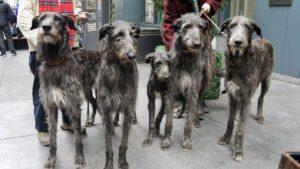
Discover the joy of Scottish heritage at the 2024 Tartan Day Parade, featuring bagpipers, dancers, and adorable Scottish dog breeds.

Matt & Anita Stelter of Wyndlair Collies share insights on Collie breed challenges, health, and the dog show community.

Interview with Marie Markovich: Insights on Collies, breed challenges, and fostering newcomers in the dog show world.
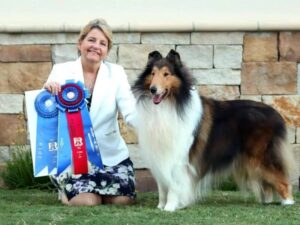
Discover Scalloway Collies with breeder Lea Bertsch. From Waco, Texas, she shares insights on the breed’s health and versatility.

Hartford-Springfield Collie Specialty Weekend: a blend of rich history, passionate enthusiasts, and the beauty of Stony Hill Preserve.

Virginia Holtz, Joan Graber, and Debbie Holland are honored by the Quarter Century Collie Group at the 2023 Awards Ceremony. Read more.
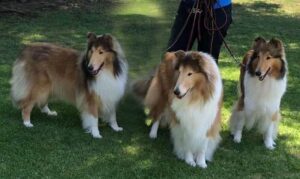
Gayle Kaye and Dr. James McCain made immeasurable contributions to the American Kennel Club and the sport of purebred dogs. Read more.

Celebrate the honorees at the Quarter Century Collie Group event in Peoria: Dr. Richard Greathouse, Dorothy Welsh, and Gayle Kaye.

Discover the joy of Scottish heritage at the 2024 Tartan Day Parade, featuring bagpipers, dancers, and adorable Scottish dog breeds.

Matt & Anita Stelter of Wyndlair Collies share insights on Collie breed challenges, health, and the dog show community.

Interview with Marie Markovich: Insights on Collies, breed challenges, and fostering newcomers in the dog show world.

Discover Scalloway Collies with breeder Lea Bertsch. From Waco, Texas, she shares insights on the breed’s health and versatility.

Hartford-Springfield Collie Specialty Weekend: a blend of rich history, passionate enthusiasts, and the beauty of Stony Hill Preserve.

Virginia Holtz, Joan Graber, and Debbie Holland are honored by the Quarter Century Collie Group at the 2023 Awards Ceremony. Read more.

Gayle Kaye and Dr. James McCain made immeasurable contributions to the American Kennel Club and the sport of purebred dogs. Read more.
The best way to ensure a long and happy relationship with a purebred dog is to purchase one from a responsible breeder. Not sure where to begin?
Contact the National Parent Club’s Breeder Referral Program, which is listed on the AKC Breeder Referral Contacts page.
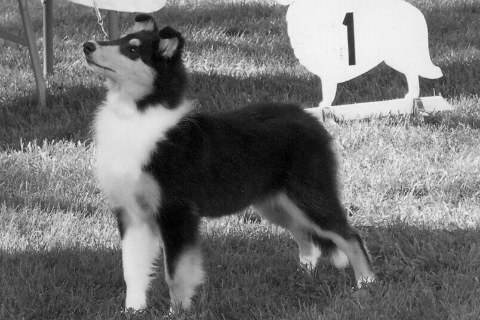

"*" indicates required fields
Showsight Magazine–the world’s most influential purebred dog publication since 1992. Each issue reaches a global audience dedicated to preserving the history and health of purpose bred dogs. Filled with award-winning editorial focused on news and insights from the dog show community, top breeders, handlers, AKC Judges, and more!